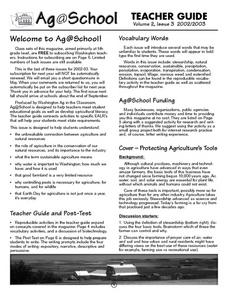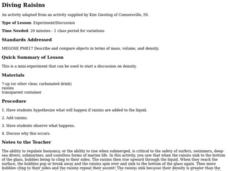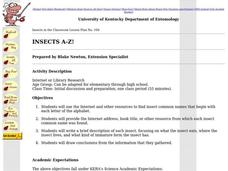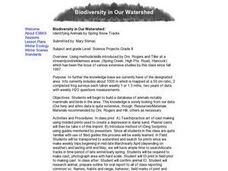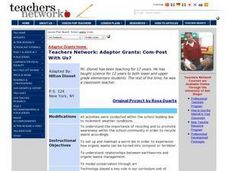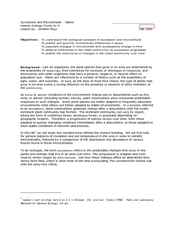Curated OER
Fred the Fish
Students read and retell the story of Fred the Fish. In groups, they create their own story of a similar nature and identify a situation in their community like the one in the story. They create possible solutions to the problem and...
Curated OER
A Seed Grows
Second graders begin the lesson by planting their own bean seed. Individually, they make predictions about how many leaves and roots their plant might grow and each day record their observations. They graph the results of the length of...
Curated OER
Mystery Constellations
Fourth graders predict constellations each month. In this astronomy lesson, 4th graders are presented with two constellations every month, and guess what they are as clues are given.
Curated OER
The Math of Light
Investigate light intensity, illuminance, and power consumption of different light source.Compare the efficiency of light bulbs then create a persuasive advertisement about it.
Curated OER
Working with Willows
Students explore their sense of touch and discover why the sense of touch is important to us and to how we observe and identify our world.
Curated OER
Sorting Pond
Learners practice balancing while learning the classifications of different animals
Curated OER
WHY WE AREN'T FILTER FEEDERS
Students describe three methods of obtaining food: scavenging, filter feeding, and hunting. They describe three methods of obtaining food: scavenging, filter feeding, hunting, and list at least two reasons why humans are not considered...
Curated OER
Protecting Agriculture's Tools
Students brainstorm which tools farmers can control and why. They discuss how to conserve water, air and soil. They discuss the role of farmers and how they feed the world.
Curated OER
Ecology: Trees
Fourth graders read the defintions of renewale and nonrenewable resources and discuss any incorrect responses. They view a sample of work for the class to see which they describe posting responses on the board in their respective columns...
Curated OER
Diving Raisins
Young scholars participate in a mini lab to explore density. In this density lesson students view a demonstration and answer questions.
Curated OER
Tree Identification
In this tree identification worksheet, students collect samples from different trees and identify them using the deciduous tree guide or the conifer key.
Curated OER
Look Mom, No Wings!
Students explain how drag, weight, lift and thrust work together to make something fly. In this physics lesson, students measure their jump height and record data on the table. They reason out why they can't remain airborne for long.
Curated OER
Tulips: Predicting the Arrival of Spring
Learners use the blooming of tulips as a tool to measure spring's journey north. They predict when tulips bloom at 13 selected Journey North gardens in various geographic regions.
Curated OER
Termite Trails
Students observe the behavior of termites and draw conclusions about their behavior. They record data as to termite behavior and recognize elements in the experimental design which must include a hypothesis.
Curated OER
Insects A-Z!
Students use the Internet and other resources to find insect common names that begin with each letter of the alphabet. They write a brief description of each insect, focusing on what the insect eats and where the insect lives.
Curated OER
Ecosystem Soil Study
Sixth graders take soil samples and analyze the samples and ecosystems found within them.
Curated OER
Drop Zone! Design and Test a Probe
Students work together to develop their own parachuting probe. They test it and record the results. They simulate other experiments that are going to be carried out by the Huygens probe.
Curated OER
Biodiversity in Our Watershed
Eighth graders create a database of animals and birds in the area in which they live. They use molded prints to make a cast of an imprint from a specific animal. They identify and research animals and prepare an outline for an oral...
Curated OER
Student Meteorologists
Students examine and use basic weather equipment and concepts and create a weather forecast. They then incorporate technology effectively into their forecast. Students use a students's trade book as a substitute for the textbook.
Curated OER
Com-Post With Us?
Students discuss the importance of reducing, recycling and reusing materials to help the environment. As a class, they create a worm bin and observe how it turns material in to compost. They use the internet to research the...
Curated OER
Gone Fishin'
Students explore fishing and the food web. They simulate the role of fisherman using candy as fish and use provided materials to create a fishing device. Afterward, they complete data tables to organize the day's catch and report the...
Curated OER
Succession and Microclimate
Students compare the population of insects in different microclimates. In this biology lesson, students collect data using probes to tabulate temperature and soil data. They predict how certain parameters change as an area goes through...
Curated OER
The Water Dance
Students act like the changes in the four seasons by moving like water in each season.
Curated OER
Inside A seed
Students examine the inside of a seed to see the beginnings of a plant. They identify the elements that plants need to grow and survive. They grow their seeds in the classroom.









